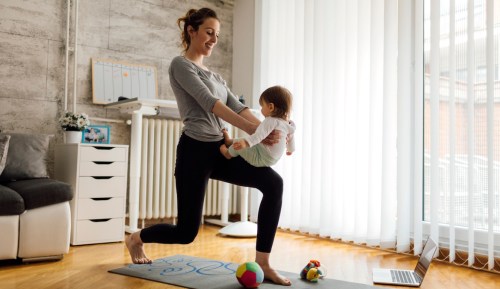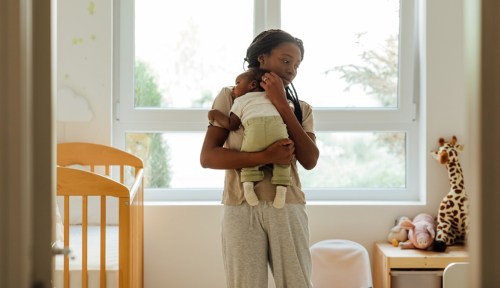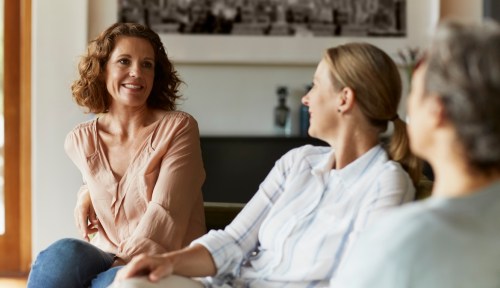Cases of postpartum anxiety have been on the rise since the start of COVID-19. This happens when someone experiences severe anxiety after becoming a parent. “These anxious feelings are often out of control and take over your thoughts,” according to The Cleveland Clinic. And while sleep, emotional support, and psychological help are all crucial interventions in mitigating the effects of postpartum anxiety, new research suggests that strength training may also provide some respite.
Experts in This Article
The non-randomized study, published in The Health and Fitness Journal of Canada, followed 19 women less than nine months postpartum who participated in a bi-weekly strength-based group exercise program created by Les Mills for eight weeks total. While it’s worth noting that this study is extremely small, and we need more robust research on psychological health for postpartum women, the results did begin to shed a light on just how effective fitness can be in improving new moms’ mental health.
At the end of the study, researchers identified two major findings of note via a questionnaire given to all participants. First, they noted that the exercise regimen reduced “state anxiety”—meaning transient but highly emotional anxiety—before and after each exercise class. Next, they noticed “significant improvement in meeting basic psychological needs (competence), and a significant improvement in autonomous regulation (intrinsic motivation),” write the study authors.
Interestingly, however, there was no reported increase in self-efficacy or improvements in depression, perceived stress, or “trait anxiety,” which is characterized by anxiety experienced across many situations.
Still, the positive results are worth pocketing if you’re a new mother (or will be soon), according to Peggy Loo, PhD, a licensed psychologist who trained with Postpartum Support International. “The results aren’t surprising to me, especially in the first few months postpartum, when mothers are often experiencing such radical life, role, and bodily changes,” she says. “There’s a huge body of evidence supporting physical activity and exercise as a way to reduce anxiety.”
According to Dr. Loo, three aspects of the research are key to understanding the kind of support freshly-minted mothers really need. “What stood out to me about the study was the group format, that women could bring their babies, and that this happened within the first nine months postpartum,” she says.
“To spend regular time aimed at investing in your body and strengthening it can be very re-empowering and return a sense of self-care and identity often forgotten in the daily tasks of parenting an infant.” —Peggy Loo, PhD
The exercise in and of itself is powerful because there’s significant research indicating that moving your body can make your mind a safer, happier place. “To spend regular time aimed at investing in your body and strengthening it can be very re-empowering and return a sense of self-care and identity often forgotten in the daily tasks of parenting an infant,” she says. Plus, given the childcare crisis has left thousands of women without proper help, the fact that the class offered that cannot be overlooked either.
“Lastly, there is always something powerful about being around women in a similar stage of life and parenting that can be reassuring that you are not alone,” says Dr. Loo.
Hopefully, future research will dive deeper into the roots of fatphobia that can also contribute to postpartum anxiety, adds Linda Baggett, PhD, of Well Woman Psychology.. “I think one critically important factor that I did not see mentioned is the issue of weight stigma and fatphobia. Any emphasis on weight loss, ‘losing the baby weight,’ or other messages about a smaller body size being better, perpetuate weight stigma and fatphobia, both of which contribute to disordered eating, increased anxiety and depression symptoms, and make exercise spaces a hostile, rather than supportive environment for anyone in a larger body,” says Dr. Baggett.
Dr. Loo says that new moms can put this research into action by adding strength training to their daily routines (even if it’s literally just 10 minutes twice a week). “I think the advancement of online options for nearly everything following Covid is something mothers can really take advantage of,” she says. “Joining an online streaming exercise class from home is now an option. Even getting a few mothers together for a weekly Zoom and sharing a screen that plays a short yoga video can creatively mimic the same structure of this study but with greater flexibility.”
Get moving with this 10-minute postnatal workout:
Sign Up for Our Daily Newsletter
Get all the latest in wellness, trends, food, fitness, beauty, and more delivered right to your inbox.
Got it, you've been added to our email list.











